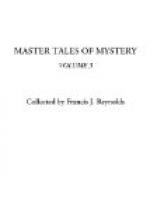He laid the letter before us. It was written in a curious grayish-black ink in a woman’s hand, and read:
* * * * *
Dear Harris:
Since we agreed to disagree we have at least been good friends, if no longer lovers. I am not writing in anger to reproach you with your new love, so soon after the old. I suppose Alma Willard is far better suited to be your wife than is a poor little actress—rather looked down on in this Puritan society here. But there is something I wish to warn you about, for it concerns us all intimately.
We are in danger of an awful mix-up if we don’t look out. Mr. Thurston—I had almost said my husband, though I don’t know whether that is the truth or not—who has just come over from New York, tells me that there is some doubt about the validity of our divorce. You recall he was in the South at the time I sued him, and the papers were served on him in Georgia. He now says the proof of service was fraudulent and that he can set aside the divorce. In that case you might figure in a suit for alienating my affections.
I do not write this with ill will, but simply to let you know how things stand. If we had married, I suppose I would be guilty of bigamy. At any rate, if he were disposed he could make a terrible scandal.
Oh, Harris, can’t you settle with him if he asks anything? Don’t forget so soon that we once thought we were going to be the happiest of mortals—at least I did. Don’t desert me, or the very earth will cry out against you. I am frantic and hardly know what I am writing. My head aches, but it is my heart that is breaking. Harris, I am yours still, down in my heart, but not to be cast off like an old suit for a new one. You know the old saying about a woman scorned. I beg you not to go back on
Your poor little deserted
Vera.
* * * * *
As we finished reading, Leland exclaimed, “That never must come before the jury.”
Kennedy was examining the letter carefully. “Strange,” he muttered. “See how it was folded. It was written on the wrong side of the sheet, or rather folded up with the writing outside. Where have these letters been?”
“Part of the time in my safe, part of the time this afternoon on my desk by the window.”
“The office was locked, I suppose?” asked Kennedy. “There was no way to slip this letter in among the others since you obtained them?”
“None. The office has been locked, and there is no evidence of any one having entered or disturbed a thing.”
He was hastily running over the pile of letters as if looking to see whether they were all there. Suddenly he stopped.
“Yes,” he exclaimed excitedly, “one of them is gone.” Nervously he fumbled through them again. “One is gone,” he repeated, looking at us, startled.
“What was is about?” asked Craig.




